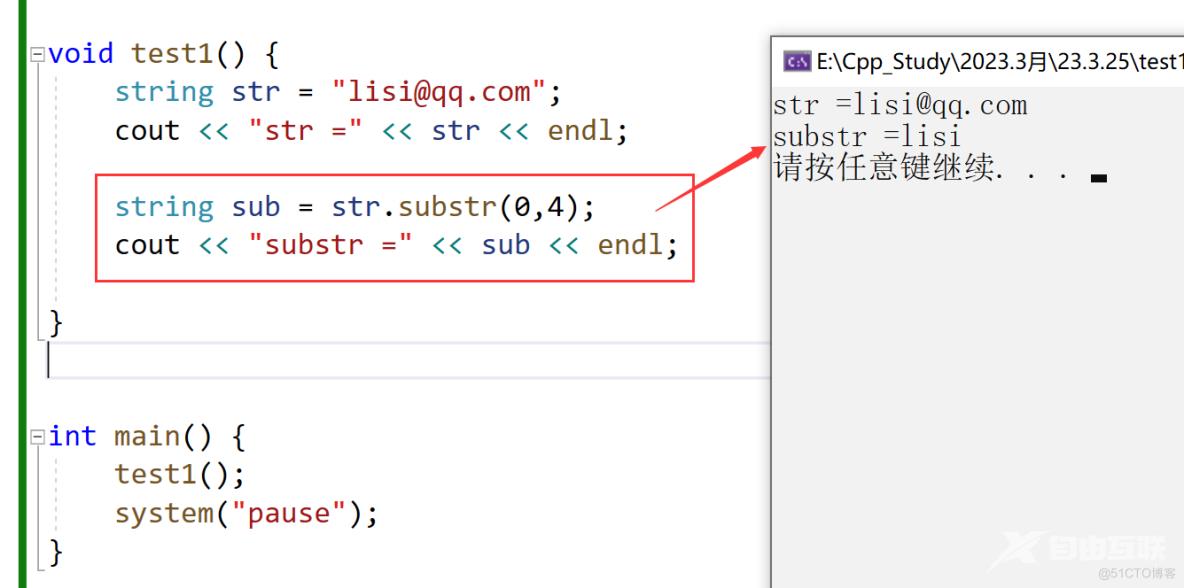一、string基本概念
1、本质
string是C++风格的字符串,而string本质上是一个类
2、string和char * 区别:
1、char * 是一个指针
2、string是一个类,类内部封装了char*,管理这个字符串,是一个char*型的容器。
3、特点:
string 类内部封装了很多成员方法
例如:查找find,拷贝copy,删除delete 替换replace,插入insert
string管理char*所分配的内存,不用担心复制越界和取值越界等,由类内部进行负责
二、string构造函数
1、构造函数原型
1、string();
//创建一个空的字符串 例如: string str;
2、string(const char* s);
//使用字符串s初始化
3、string(const string& str);
//使用一个string对象初始化另一个string对象
4、string(int n, char c);
//使用n个字符c初始化
2、示例
void test01() {
string s;
const char* str = "halouwa";
string s1(str);
cout << "s1="<<s1 << endl;
string s2(s1);
cout << "s2=" << s2 << endl;
string s3(10, 'a');
cout << "s3=" << s3<< endl;
}
int main() {
test01();
system("pause");
return 0;
}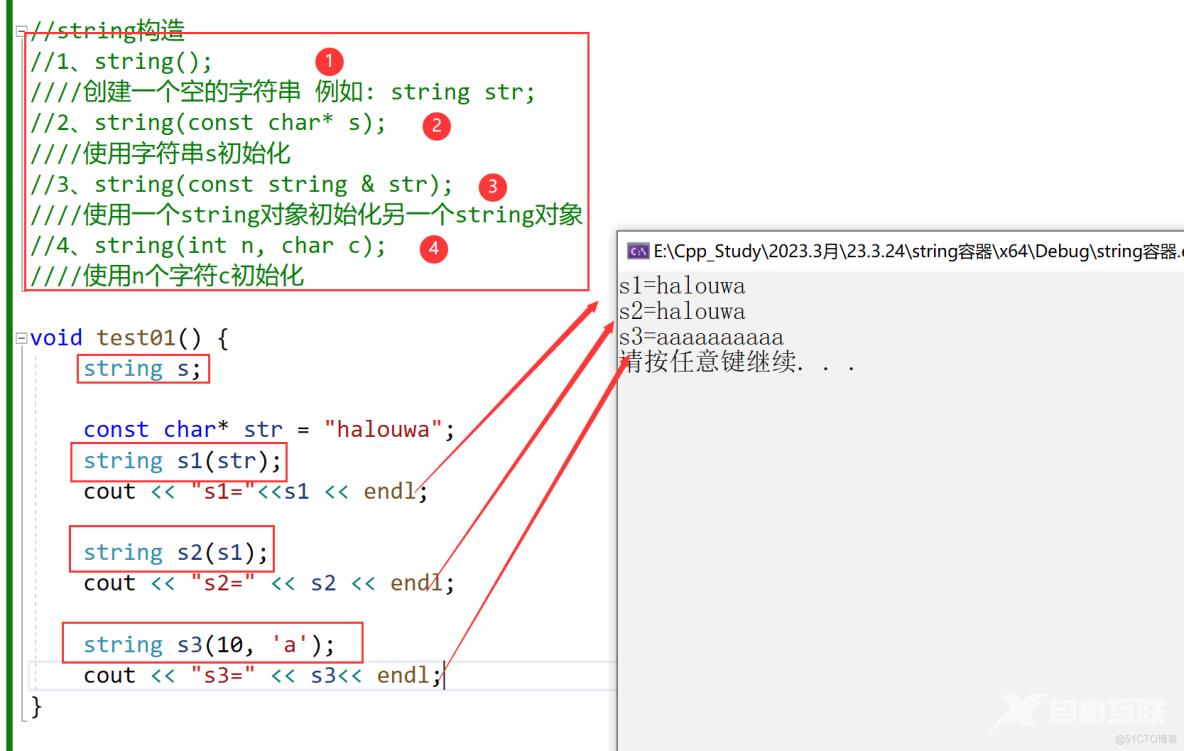
三、string赋值操作
功能描述:给string字符串进行赋值
1、赋值的函数原型
1、string& operator=(const char* s);
//char*类型字符串 赋值给当前的字符串
2、string& operator=(const string &s);
//把字符串s赋给当前的字符串
3、string& operator=(char c);
//字符赋值给当前的字符串
4、string& assign(const char *s);
//把字符串s赋给当前的字符串
5、string& assign(const char *s, int n);
//把字符串s的前n个字符赋给当前的字符串
6、string& assign(const string &s);
//把字符串s赋给当前字符串
7、string& assign(int n, char c);
//用n个字符c赋给当前字符串
2、示例
void test01() {
string s1;
const char* s = "hello s1";
s1 = s;
cout << "s1 = " << s1 << endl;
string s2;
s2 = s1;
cout << "s2 = " << s2 << endl;
string s3;
char c = 'c';
s3 = c;
cout << "s3 = " << s3 << endl;
string s4;
s4.assign("hello s4");
cout << "s4 = " << s4 << endl;
string s5;
s5.assign("hello s4",5);
cout << "s5 = " << s5 << endl;
string s6;
s6.assign(s5);
cout << "s6 = " << s6 << endl;
string s7;
s7.assign(10,'w');
cout << "s7 = " << s7 << endl;
}
int main() {
test01();
system("pause");
return 0;
}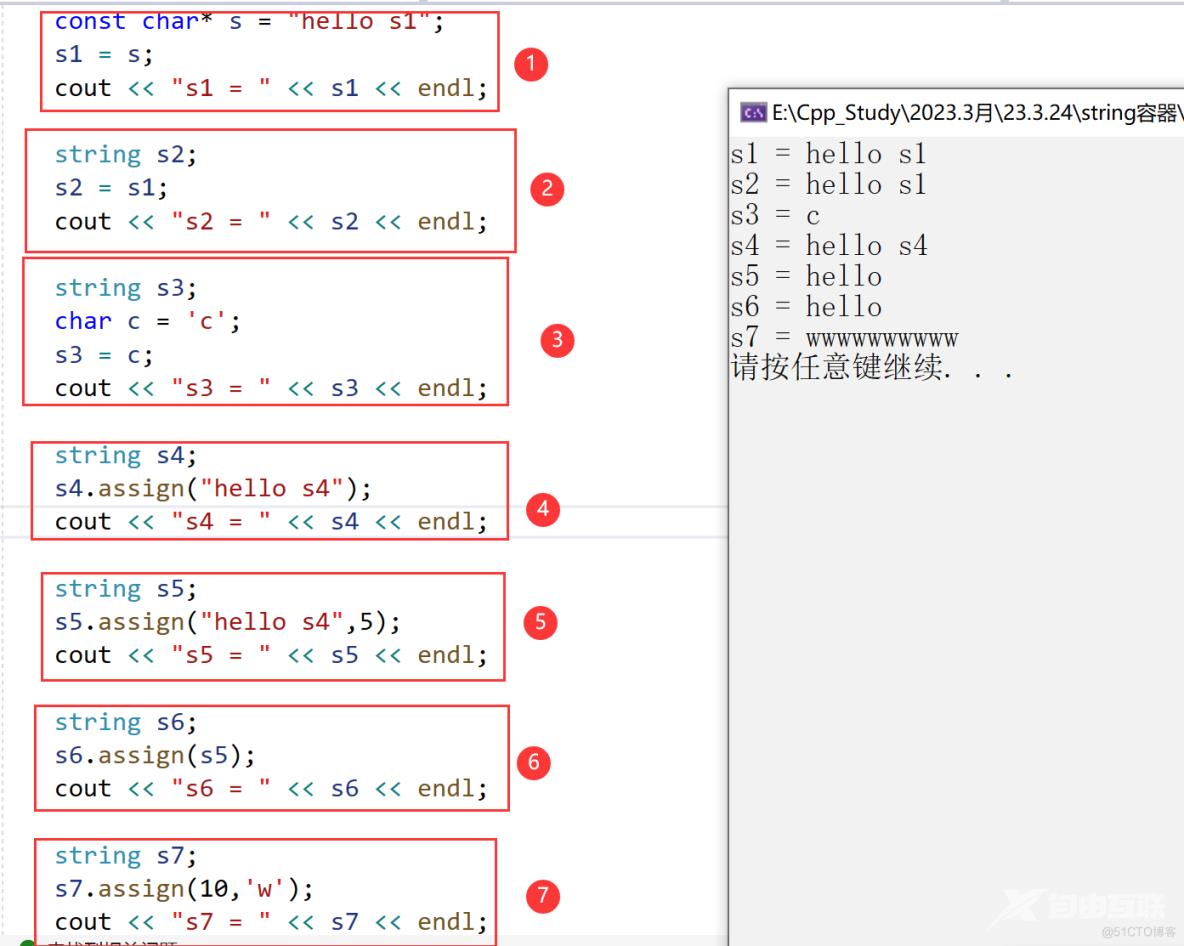
总结:
string的赋值方式有很多,operator= 这种方式最常用
四、string字符串拼接
功能描述:
实现在字符串末尾拼接字符串
1、函数原型
1、string& operator+=(const char* str);
//重载+=操作符
2、string& operator+=(const char c);
//重载+=操作符
3、string& operator+=(const string& str);
//重载+=操作符
4、string& append(const char *s);
//把字符串s连接到当前字符串结尾
5、string& append(const char *s, int n);
//把字符串s的前n个字符连接到当前字符串结尾
6、string& append(const string &s);
//同operator+=(const string& str)
7、string& append(const string &s, int pos, int n);
//字符串s中从pos开始的n个字符连接到字符串结尾
2、示例
//字符串拼接
void test01() {
string s1 = "我";
s1 += "爱学习";
cout << "s1 = " << s1 << endl;
s1 += ':';
cout << "s1 = " << s1 << endl;
string s = "c++";
s1 += s;
cout << "s1 = " << s1 << endl;
string s2;
s2.append("I ");
cout << "s2 = " << s2 << endl;
s2.append("like you",5);
cout << "s2 = " << s2 << endl;
string s3 = "study ";
s2.append(s3);
cout << "s2 = " << s2 << endl;
string s4 = "python c++";
s2.append(s4,7,3);
cout << "s2 = " << s2 << endl;
}
int main() {
test01();
system("pause");
}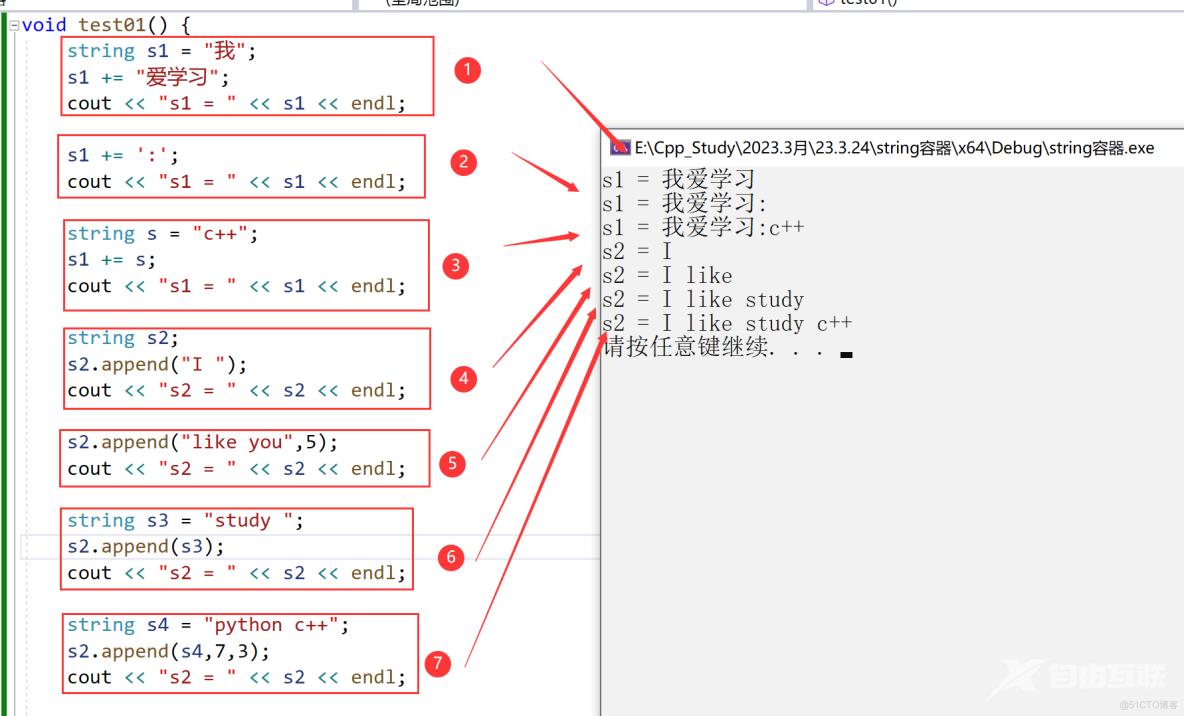
五、string查找和替换
1、功能描述
查找:查找指定字符串是否存在
替换:在指定的位置替换字符串
2、函数原型
1、int find(const string& str, int pos = 0) const;
//查找str第一次出现位置,从pos开始查找
2、int find(const char* s, int pos = 0) const;
//查找s第一次出现位置,从pos开始查找
3、int find(const char* s, int pos, int n) const;
//从pos位置查找s的前n个字符第一次位置
4、int find(const char c, int pos = 0) const;
//查找字符c第一次出现位置
5、int rfind(const string& str, int pos = npos) const;
//查找str最后一次位置,从pos开始查找
6、int rfind(const char* s, int pos = npos) const;
//查找s最后一次出现位置,从pos开始查找
7、int rfind(const char* s, int pos, int n) const;
//从pos查找s的前n个字符最后一次位置
8、int rfind(const char c, int pos = 0) const;
//查找字符c最后一次出现位置
9、string& replace(int pos, int n, const string& str);
//替换从pos开始n个字符为字符串str
10、string& replace(int pos, int n,const char* s);
//替换从pos开始的n个字符为字符串s
3、示例
//字符串的查找和替换
//1、查找
void test01() {
string str = "asdfggghhhjj";
//找到,返回索引,未找到,返回-1
int pos = str.find("gg");
cout << pos << endl;
//find,从左往右找,rfind,从右往左找
pos = str.rfind("gg");
cout << pos << endl;
}
//2、替换
void test02() {
string str1 = "qwertyuiop";
//将第2个字符开始的后0个字符,替换成”1111“
str1.replace(2,0,"1111");
cout << str1 << endl;
}
int main() {
test01();
test02();
}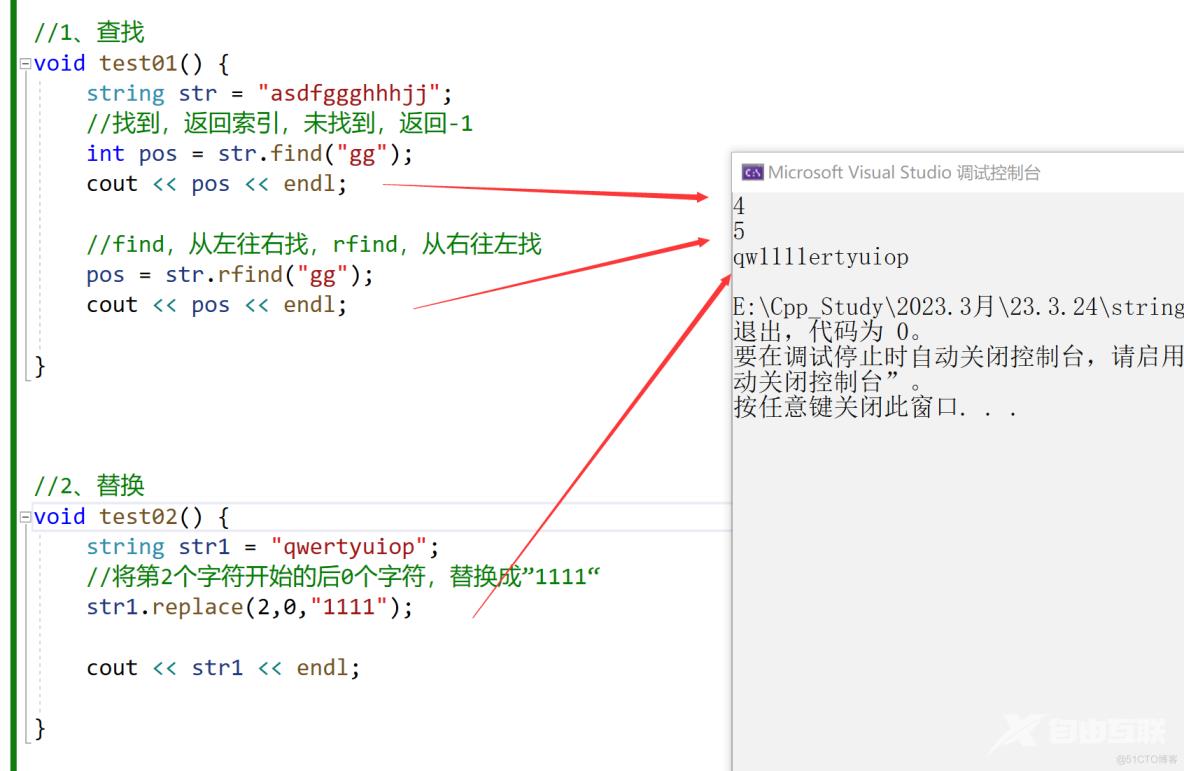
总结:
1、find查找是从左往右,rfind从右往左
2、find找到,返回查找的第一个字符位置,未找到返回-1
3、replace在替换时,需要指定从那个位置起,多少个字符,替换成什么样的字符串
六、string字符串比较
1、功能描述
字符串之间的比较
2、比较方式
字符串比较是按字符的ASCII码进行对比
= 返回 0
> 返回 1
< 返回 -1
3、函数原型
1、int compare(const string &s) const;
//与字符串s比较
2、int compare(const char *s) const;
//与字符串s比较
4、示例
//字符串比较
void test01() {
string str1 = "hello";
string str2 = "hello";
if (str1.compare(str2) == 0) {
cout << "相等" << endl;
}
else if (str1.compare(str2) == 1) {
cout << "str1 > str2" << endl;
}
else if (str1.compare(str2) == -1) {
cout << "str1 > str2" << endl;
}
else
cout << "错误" << endl;
}
int main() {
test01();
}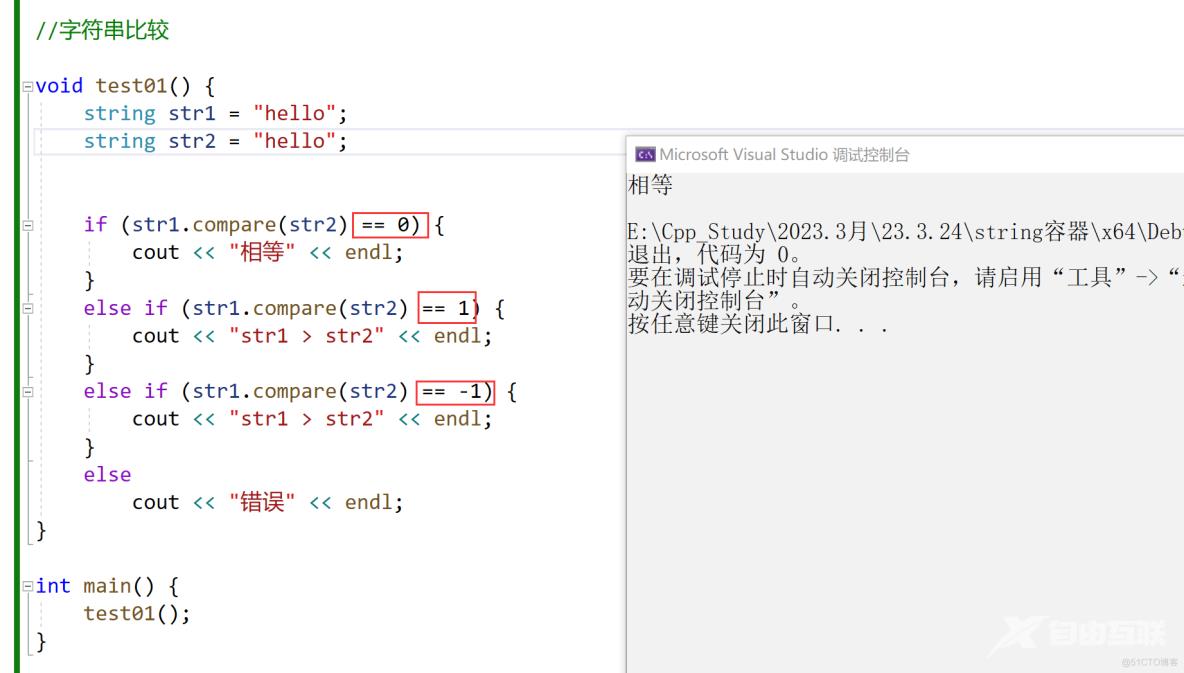
总结:
字符串对比主要是用于比较两个字符串是否相等,判断谁大谁小的意义并不是很大
七、string字符存取
1、存取方式
string中单个字符存取方式有两种
1、char& operator[](int n); //通过[]方式取字符
2、char& at(int n); //通过at方法获取字符
2、示例
//字符串单个字符的存取
void test1() {
string str = "hello";
cout << "str = " << str << endl;
//访问
for (int i = 0; str[i] != '\0';i++) {
cout<<str[i] << " ";
}
cout << endl;
for (int i = 0; i<str.size();i++) {
cout << str.at(i) << " ";
}
cout << endl;
//修改
str[0] = 'x';
cout << "str = " << str << endl;
str.at(1) = 'x';
cout << "str = " << str << endl;
}
int main() {
test1();
system("pause");
return 0;
}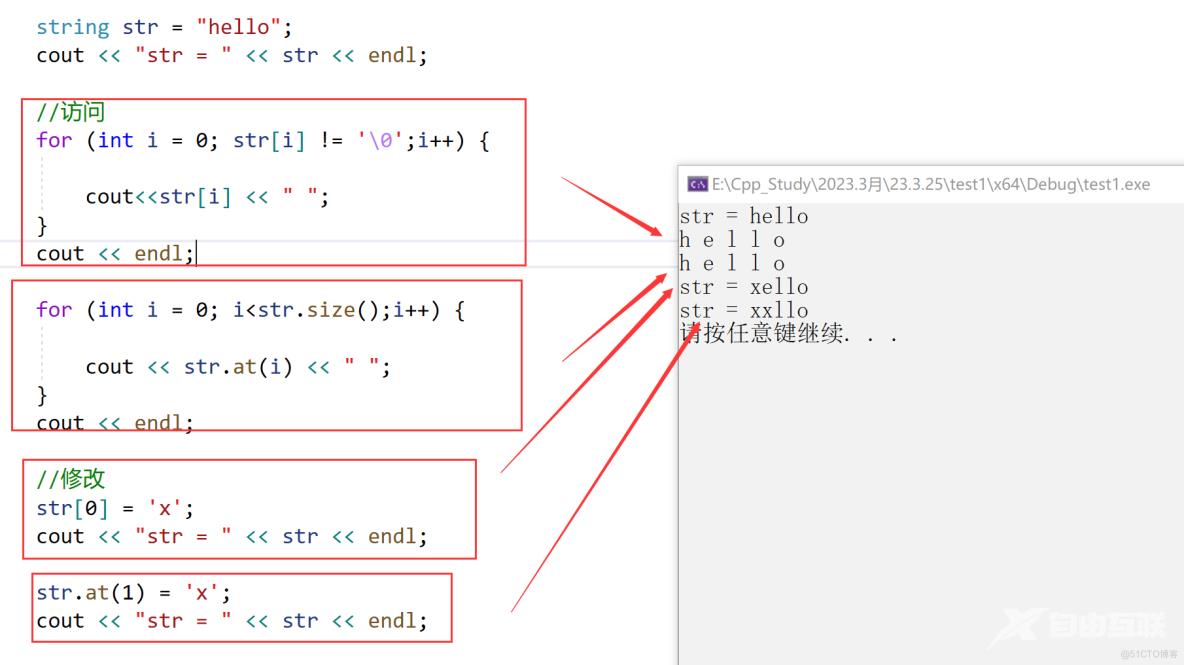
八、string插入和删除
功能描述:
对string字符串进行插入和删除字符操作
1、函数原型
1、string& insert(int pos, const char* s);
//插入字符串
2、string& insert(int pos, const string& str);
//插入字符串
3、string& insert(int pos, int n, char c);
//在指定位置插入n个字符c
4、string& erase(int pos, int n = npos);
//删除从Pos开始的n个字符
2、示例
//字符串的插入和删除
void test1() {
string str = "algorithm";
cout << "str = " << str << endl;
//插入
str.insert(1,"xxx");
cout << "str = " << str << endl;
//删除
str.erase(1,3);
cout << "str = " << str << endl;
}
int main() {
test1();
system("pause");
}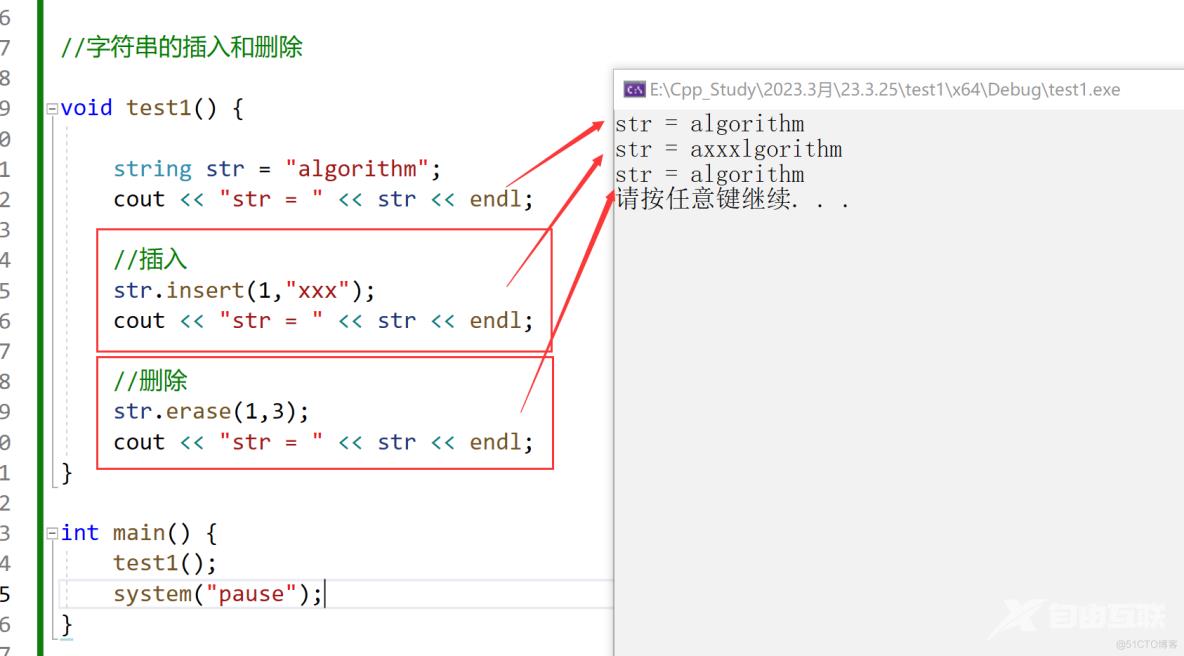
九、string子串
功能描述:
从字符串中获取想要的子串
1、函数原型
1、string substr(int pos = 0, int n = npos) const;
//返回由pos开始的n个字符组成的字符串
2、示例
void test1() {
string str = "lisi@qq.com";
cout << "str =" << str << endl;
string sub = str.substr(0,4);
cout << "substr =" << sub << endl;
}
int main() {
test1();
system("pause");
}